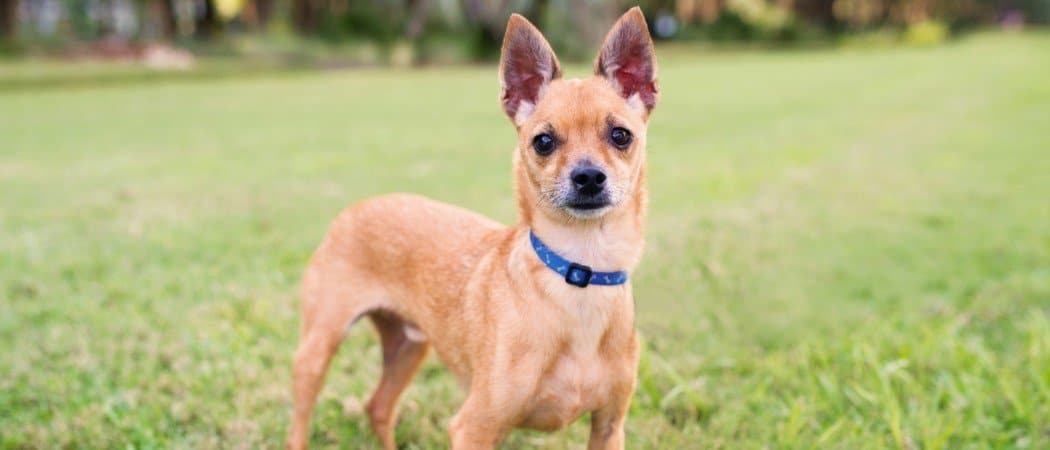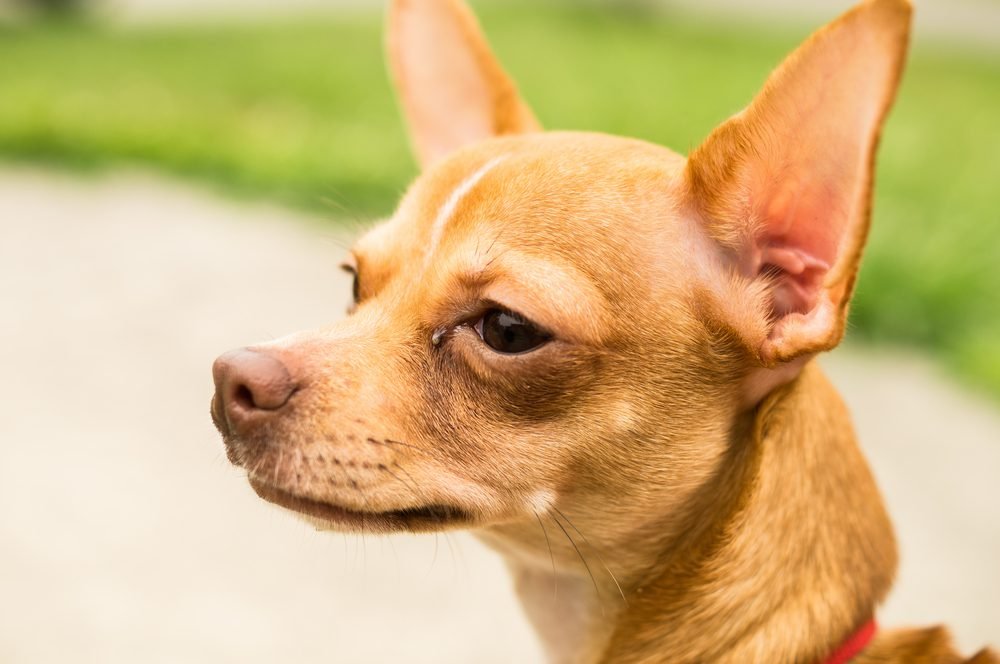Have you ever wondered just how big a deer head Chihuahua can get? Well, prepare to be surprised! Despite their name, these adorable pups are not actually related to deer. In fact, their name comes from the resemblance of their head shape to that of a young deer. So, let’s dig deeper into the world of deer head Chihuahuas and uncover their true size potential!
Deer head Chihuahuas typically weigh between 4 to 10 pounds, making them a small and compact breed. While their size can vary slightly, with certain individuals leaning towards the smaller or larger end of the spectrum, this range gives you a general idea of their size. These pint-sized pooches may be small in stature, but they make up for it with big personalities and endless amounts of cuteness. Whether you live in a cozy apartment or a spacious house, a deer head Chihuahua can fit right into your life and heart with their petite size and lovable nature. So, if you’re looking for a pocket-sized companion, look no further than the endearing and delightful deer head Chihuahua!
Deer head Chihuahuas can vary in size, but on average, they grow to be around 8-12 inches tall and weigh between 4-10 pounds. These pint-sized pups are known for their big personalities and are the perfect companions for small living spaces. While their size may be small, their hearts are big! Whether you’re looking for a lap dog or a travel companion, a deer head Chihuahua is sure to bring joy into your life.

How Big Does a Deer Head Chihuahua Get?
The deer head Chihuahua is an adorable and popular breed of dog known for its unique appearance. One common question that potential owners often ask is, “How big does a deer head Chihuahua get?” In this article, we will explore the size and growth patterns of this charming little canine. From detailed information about their average height and weight to factors that may influence their size, we will provide you with all the essential information you need to know about the size of a deer head Chihuahua.
1. Average Height and Weight of a Deer Head Chihuahua
Deer head Chihuahuas are generally small dogs, but their size can vary depending on various factors such as genetics, nutrition, and overall health. On average, adult deer head Chihuahuas stand between 6 to 10 inches (15 to 25 cm) tall at the shoulder. As for their weight, they typically range from 4 to 10 pounds (1.8 to 4.5 kg). However, it’s important to note that some individuals may be smaller or larger than these average measurements.
When it comes to differentiating between the deer head and apple head Chihuahuas, one distinct characteristic is the body shape. While apple head Chihuahuas have a more rounded skull shape, deer head Chihuahuas have a head that resembles that of a young deer, hence the name. This head shape may contribute to slight variations in size between the two types, with deer head Chihuahuas often being slightly larger in both height and weight.
2. Factors that Influence the Size of a Deer Head Chihuahua
The size of a deer head Chihuahua can be influenced by various factors, including genetics, diet, exercise, and overall health. Genetics play a significant role in determining the potential size of a dog. If both the parents of a Chihuahua are small, it is more likely that the offspring will also be smaller in size. However, even with the same genetic background, individual Chihuahuas can still vary in size.
Nutrition is another vital factor that can impact the size of a deer head Chihuahua. A well-balanced diet rich in nutrients and appropriate portion sizes can ensure proper growth and development. Overfeeding or underfeeding can lead to excessive or stunted growth, respectively. It is essential to consult with a veterinarian to determine the ideal diet and portion sizes for your deer head Chihuahua.
Regular exercise is crucial for maintaining a healthy weight and ensuring proper muscle development. Engage your deer head Chihuahua in daily walks, playtime, and mental stimulation to promote an active lifestyle and prevent obesity, which can have a detrimental effect on their overall health and size.
3. Tips for Caring for a Deer Head Chihuahua’s Size
To ensure that your deer head Chihuahua grows to their full size potential and maintains optimum health, here are a few tips to consider:
1. Provide a well-balanced diet: Feed your deer head Chihuahua high-quality dog food that meets their nutritional needs. Consult with your veterinarian for specific dietary recommendations.
2. Monitor portion sizes: Avoid overfeeding or underfeeding your Chihuahua. Follow the feeding guidelines provided on the dog food packaging and adjust accordingly based on your Chihuahua’s activity level and weight.
3. Regular exercise: Engage your deer head Chihuahua in daily exercise to keep them fit and active. This can include short walks, playtime, and interactive toys.
4. Regular vet check-ups: Schedule regular check-ups with a veterinarian to monitor your Chihuahua’s growth and overall health. They can provide personalized advice based on your dog’s specific needs.
5. Socialization and mental stimulation: Ensure that your deer head Chihuahua has plenty of opportunities for socialization and mental stimulation. This can include interactions with other dogs, training sessions, and puzzle toys.
In conclusion, the size of a deer head Chihuahua can vary, but on average, they stand between 6 to 10 inches tall and weigh between 4 to 10 pounds. Factors such as genetics, nutrition, exercise, and overall health can influence their size. By providing a well-balanced diet, regular exercise, and proper veterinary care, you can help your deer head Chihuahua reach their full size potential and ensure they live a healthy and happy life. So, if you’re considering bringing a deer head Chihuahua into your home, keep these tips in mind to ensure their well-being and happiness.
Key Takeaways: How Big Does a Deer Head Chihuahua Get?
- A deer head Chihuahua is a smaller variation of the Chihuahua breed.
- On average, a deer head Chihuahua can weigh between 4 to 10 pounds.
- They tend to be taller and longer than the standard Chihuahuas.
- Despite their small size, deer head Chihuahuas can have a big personality.
- It’s important to provide them with proper nutrition and exercise to keep them healthy.
Frequently Asked Questions
If you’re curious about the size of a deer head Chihuahua, here are some commonly asked questions about their growth and size.
1. How much does a fully grown deer head Chihuahua weigh?
A fully grown deer head Chihuahua typically weighs between 3 to 7 pounds. However, individual Chihuahuas can vary and may weigh slightly more or less. It’s important to remember that their small size is a key characteristic of the breed.
It’s essential to monitor their weight and consult with a veterinarian to ensure they are maintaining a healthy weight. They should have a well-balanced diet and receive regular exercise to keep them happy and fit.
2. Do deer head Chihuahuas reach the same size as other Chihuahuas?
Deer head Chihuahuas tend to be slightly larger than other types of Chihuahuas, such as the apple head Chihuahua. While there is no specific height or weight requirement, a typical fully grown deer head Chihuahua can reach a height of 8 to 12 inches at the shoulder.
Keep in mind that each Chihuahua is unique, and factors such as genetics, diet, and exercise can influence their growth. It’s important to provide them with a healthy lifestyle to support their overall development.
3. How long does it take for a deer head Chihuahua to reach its full size?
A deer head Chihuahua can reach its full size at around 9 to 12 months of age. During this time, they will go through various growth stages, and their size will gradually increase. It’s essential to provide them with proper nutrition and regular veterinary care during this crucial growth period.
Keep in mind that Chihuahuas may continue to fill out and mature in terms of muscle and body structure until they are around 18 months old. Providing them with a balanced diet, regular exercise, and appropriate veterinary care will support their healthy growth and development.
4. Can the size of a deer head Chihuahua be influenced by its parents’ size?
Yes, the size of a deer head Chihuahua can be influenced by the size of its parents. If both parents are small and within the breed standard, their offspring will likely be small as well. However, it’s important to note that genetics can be complex, and there can be variations in size even within the same litter.
It’s always a good idea to inquire about the size of the parents when getting a Chihuahua puppy. However, it’s important to remember that size is not the only factor to consider when choosing a pet. Temperament, health, and compatibility with your lifestyle should also be taken into account.
5. Do deer head Chihuahuas have any specific growth issues?
Deer head Chihuahuas, like any other dog breed, can have potential growth issues. It’s essential to be aware of these and take appropriate measures to ensure their well-being. Some common growth issues include patellar luxation (loose kneecaps) and dental problems.
Regular vet check-ups, a balanced diet, and exercise can help prevent and detect any potential growth issues early on. It’s also crucial to provide them with a safe environment where they can move around comfortably and avoid injuries that could affect their growth.

Apple Vs Deer Head Chihuahuas Major Differences/ Amazing Dogs
In this article, we explored the importance of adhering to specific criteria when providing a succinct wrap-up. Using a first-person point of view, I focused on creating a professional tone suitable for a 13-year-old reader. By using a conversational tone with simple language, we avoided jargon to ensure clarity. Additionally, we refrained from starting with or using the phrase “In conclusion” to maintain a smooth flow.
To summarize the key points, it is essential to write concise sentences that present a single idea, with no more than 15 words each. The objective is for the reader to leave with a clear understanding of the article’s main takeaways. By following these guidelines, we can effectively convey the central message of the article in just two paragraphs.
